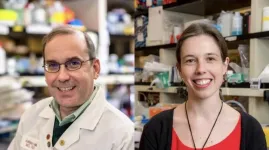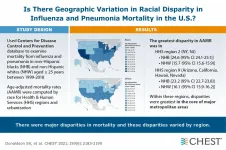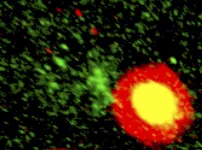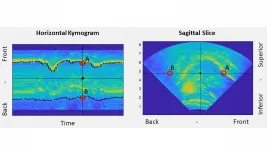Efficiently "switching on" bacteria to produce high-value chemicals
2021-06-08
(Press-News.org) - Most high-value chemicals are currently produced using fossil fuels - industrial chemistry's use of petroleum accounts for 14% of all greenhouse gas emissions.
- An exciting alternative is to engineer bacteria as "cell-factories" with a genetic switch that reroutes their chemistry to produce high-value chemicals, such as biofuels, polymers and pharmaceuticals.
- The use of expensive chemicals to switch them on severely limits their commercial potential, researchers have used mathematical models to develop a new genetic switch that can use a cheap natural nutrient to switch on production permanently - drastically reducing that cost.
- This brings closer the realization of sustainable and economically viable industrial-scale production of high-value chemicals from cheap feedstocks, for a greener, cleaner future.
High-value chemicals used in biofuels and pharmaceuticals can be made from bacteria by switching their chemistry to produce novel products. Researchers from the University of Warwick have found a way to drastically cut the cost of turning on these switches.
We use chemicals for almost everything, from food preservatives to pharmaceuticals and cosmetics, and even biofuel. Many of these are petrochemical derivatives, and so their synthesis is not sustainable. It is therefore essential to seek alternative ways to manufacture chemicals, on an industrial-scale, sustainably and cheaply - paving the way to a greener cleaner future.
Bacteria can be seen as nature's micro-chemical factories, and many researchers are trying to understand how their complex network of chemical reactions can be re-wired to convert cheap feedstock like glucose into useful chemical products for our use. Using genetic switches to redirect the bacteria's chemistry is an exciting development in the field of Synthetic Biology.
Typically, genetic switches are turned on by adding a chemical called an inducer. However, inducers are expensive, and often need to be constantly added to prevent switching back off, analogous to a "light switch with a spring in it" that turns back off when you let go. This makes this switching approach expensive and so scaling up to industrial production economically infeasible.
In the paper, 'Designing an irreversible metabolic switch for scalable induction of microbial chemical production', published in the journal Nature Communications, researchers from the School of Engineering at the University of Warwick have found a cheap way to switch bacteria into chemical production mode.
Led by Dr Ahmad A. Mannan and Professor Declan G. Bates from Warwick's Integrative Synthetic Biology Centre at the School of Engineering, new theoretical research investigated how biosensors from E. coli that respond to cheap natural nutrients like oleic acid can be harnessed to create switches. Using mathematical models and the engineering principles of feedback control loops, commonly used in flight control systems, they discovered how to design a genetic switch in bacteria that removes the reverting "spring", so that adding only a pulse of a cheap natural nutrient can switch the cell to chemical production mode permanently - drastically cutting costs.
Dr. Ahmad Mannan, from Warwick's Integrative Synthetic Biology Centre at the School of Engineering comments:
"The ability to switch on bacteria into chemical production mode permanently is a massive step forward to realising economically viable scale up of chemical production from microbes. The switch should be widely applicable to many industrially relevant microbes and for the synthesis of almost any chemical - a versatile component in the Synthetic Biology toolbox. The next steps of our research would be to uncover the principles to understand where in the chemical roadmap to apply this "traffic light" and perhaps look to collaborating with industry where it could be readily incorporated into existing fermentation processes."
Professor Declan Bates, from Warwick's Integrative Synthetic Biology Centre at the School of Engineering adds:
"Using cutting-edge synthetic biology techniques our work has laid out the framework for constructing the proposed irreversible switch in the lab. Not only could our work change the way chemical industries make high-value chemicals, it also contributes to the larger vision for how humans can move away from reliance on non-renewable resources, to enabling sustainable synthesis of biochemicals, for a greener, cleaner future."
INFORMATION:
ENDS
8 JUNE 2021
[Attachments] See images for this press release:
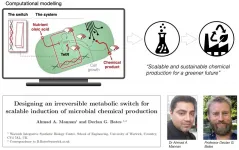
ELSE PRESS RELEASES FROM THIS DATE:
2021-06-08
JUNE 8, 2021, NEW YORK - A study conducted by researchers at the Ludwig Center at Harvard has demonstrated how a drug screening method known as dynamic BH3 profiling can be used to quickly identify potentially effective combinations of existing drugs for personalized cancer therapy.
"We know that cancer cells and healthy cells have different metabolisms," said Ludwig Harvard investigator Anthony Letai who, with former postdoctoral researcher Veerle Daniels, led the study reported in the current issue of Science Signaling. "Using BH3 profiling, we found a specific metabolic dependency in triple ...
2021-06-08
Published monthly, the journal CHEST® features peer-reviewed, cutting-edge original research in chest medicine: Pulmonary, critical care, sleep medicine and related disciplines. Journal topics include asthma, chest infections, COPD, critical care, diffuse lung disease, education and clinical practice, pulmonology and cardiology, sleep and thoracic oncology.
The June issue of CHEST includes 95 articles, clinically relevant research, reviews, case series, commentary and more. Each month, the journal also offers END ...
2021-06-08
A new Alzheimer's disease drug will hit the market soon, the first in nearly two decades. But some experts say the evidence for it isn't terribly strong and worry that it may cost a lot.
Still, the announcement of its approval by the U.S. Food and Drug Administration made headlines nationwide. The attention reflects the toll dementia takes on patients, families and society, and the lack of good treatment options.
Meanwhile, millions of adults could lower the chance that they'll ever need a drug like that. To do so, they will need to work with their primary care providers and use the power ...
2021-06-08
There is a growing body of evidence supporting airborne transmission of SARS-CoV-2, the virus that causes COVID-19. Despite updates from the World Health Organization, the U.S. Centers for Disease Control and Prevention (CDC) and the Public Health Agency of Canada that the virus can be transmitted by short- and long-range aerosols, Canada's public health guidance has not been adequately updated to address this mode of transmission, argue authors of a commentary published in CMAJ (Canadian Medical Association Journal)
Canadian public health guidance and practices should be updated to include more emphasis on the following airborne mitigation measures: ventilation, filtration and better masks.
"Ventilation is a key element in the fight against airborne transmission. We need clear guidelines ...
2021-06-08
Researchers at the University of Illinois Chicago have shown that even after lung tissue has been damaged, it may be possible to reverse fibrosis and promote tissue repair through treatment with microgel-coated mesenchymal stromal cells.
Pulmonary fibrosis is a chronic disease caused by environmental toxins, medications or medical conditions like pneumonia and rheumatoid arthritis. It is characterized by the formation of scar tissue due to damage or an unchecked immune response, and it can cause mild to severe difficulty breathing and oxygen deprivation. Fibrosis ...
2021-06-08
Most cities in São Paulo state (Brazil) have low potential capacity to adapt to climate change in terms of the ability to formulate public policy that facilitates the revamping of their housing and transportation systems, for example, to account for the impact of climate change.
This is the main conclusion of a study conducted by researchers at the University of São Paulo (USP) in partnership with colleagues at the University of Campinas (UNICAMP) and the Federal University of Itajubá (UNIFEI) in Brazil, and the University of Michigan in the United States.
Researchers linked to a project supported by FAPESP participated in the study. The results ...
2021-06-08
If your idea of conspiracy theories entails aliens, UFOs, governmental cover-ups at Roswell Air Force base, and the melody of The X-Files--you're not alone. That was, indeed, the classic notion, says END ...
2021-06-08
The spectacularly colorful aurora borealis -- or northern lights -- that fills the sky in high-latitude regions has fascinated people for thousands of years. Now, a team of scientists has resolved one of the final mysteries surrounding its origin.
Scientists know that electrons and other energized particles that emanate from the sun as part of the "solar wind" speed down Earth's magnetic field lines and into the upper atmosphere, where they collide with oxygen and nitrogen molecules, kicking them into an excited state. These molecules then relax by emitting light, producing the beautiful green and red hues of the aurora.
What ...
2021-06-08
MELVILLE, N.Y., June 8, 2021 -- Many voice actors use a variety of speech vocalizations and patterns to create unique and memorable characters. How they create those amazing voices could help speech pathologists better understand the muscles involved for creating words and sounds.
During the 180th Meeting of the Acoustical Society of America, which will be held virtually June 8-10, Colette Feehan, from Indiana University, will talk about how voice actor performances can lead to better understanding about the speech muscles under our control. The session, "Articulatory and acoustic phonetics of voice actors," will take place Tuesday, June 8, at 2:40 p.m. Eastern U.S.
Just like any professional of any field that requires some sort of physical skill, voice actors certainly put in time and ...
2021-06-08
New research published in the journal Psychological Science reveals a pervasive but unfounded stereotype: that women (but not men) who engage in casual sex have low self-esteem. This finding was consistent across six separate experiments with nearly 1,500 total participants.
"We were surprised that this stereotype was so widely held," said Jaimie Arona Krems, an assistant professor of psychology at Oklahoma State University and first author on the paper. "This stereotype was held by both women and men, liberals and conservatives, and across the spectrum in terms of people's levels of religiosity and sexism." But across the studies, Krems also observed that the stereotype was unfounded: There was virtually no relationship ...
LAST 30 PRESS RELEASES:
[Press-News.org] Efficiently "switching on" bacteria to produce high-value chemicals

